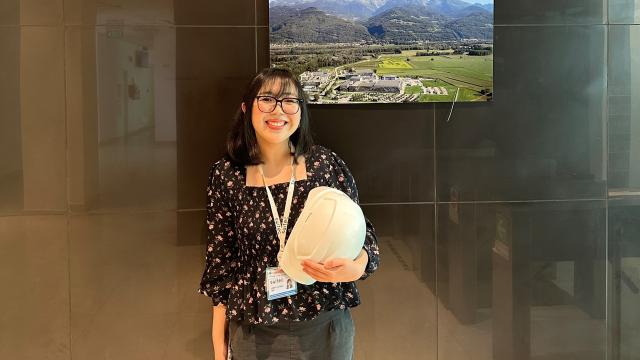Under the mentorship of SIT undergraduates, four groups of secondary school students on the YES! Programme came up with creative solutions for community issues that arise from the burning of joss paper.
While the annual Hungry Ghost Festival has become a colourful feature of the local calendar with its boisterous blend of charity auctions and heartland concerts known as getai, it has also brought with it less welcomed by-products: smoke and ash.
Every year, as devotees burn joss paper – believed to be a way of offering money and wealth to deceased loved ones – it leads to municipal complaints of pollution and littering.
This community issue was one of several that students from Tanglin Secondary School and Yusof Ishak Secondary School came up with creative solutions to tackle.

YES! mentor Poh Zheng Yong and his mentees from Yusof Ishak Secondary School in the design thinking workshop.
It is part of SIT’s Young Engineers’ Space (YES!) Programme, started in 2016 to inspire secondary school students in STEM (science, technology, engineering and mathematics). Over four months every year, Secondary 3 and 4 students who are in the Normal Academic/Normal Technical streams, as well as those from less privileged families, are mentored by SIT undergraduates in STEM subjects. They also receive support from SIT faculty and Professional Officers to expand their knowledge and skills in areas such as robotics, programming, 3D printing, and food technology.
This year’s edition of the YES! Programme focused on applying design thinking to community projects. The results were a breath of fresh air.
Keeping the Environment Clean and Green
To tackle pollution caused by the burning of joss paper, three groups of students brainstormed ways to create more environmentally-friendly bins.
The two teams from Tanglin Secondary School worked on filtering the air that comes out of the bins before releasing it into the environment.
One team came up with the idea of a dome-shaped cover with a mesh filter that could be retrofitted onto existing bins. The other team envisioned installing a fan that would trap the pollutants, which will then be disposed of directly into a waste truck via a conveyor belt.
“The fan-fitted bin prevents health problems, is easy and convenient to use, and opens up job opportunities for cleaners and truck drivers who will dispose of ashes,” said Philrich, 16.

Asst Prof Mark Teo (Design and Specialised Business cluster), who led the design thinking workshop, guiding the mentees from Tanglin Secondary School.
Meanwhile, a team from Yusof Ishak Secondary School proposed retrofitting current bins with a lid to prevent ash and joss paper from flying out. They also added a filtration unit that would work like a car’s catalytic convertor to filter out toxic and harmful gases like carbon dioxide.
“We found it challenging at first as we did not know how to approach the problem. But with the guidance of our mentors from SIT, we eventually came up with a solution inspired by our personal experiences and the feedback from residents. With our invention, cleaners do not need to clean the area as regularly,” said Aaron, 16.
Facilitating Fair Bin Usage
Noting how arguments can arise when residents compete for the use of limited bins, a second team from Yusof Ishak Secondary School proposed creating a smart kiosk, which they named R-2005.
The kiosk would come with a touch screen panel that allows residents to book the use of bins, with a speaker and braille instructions on the side to cater to the visually and hearing impaired. Residents would also be able to buy joss paper and sticks from the kiosk.

YES! mentors conducting on-site survey with residents in Ang Mo Kio to ascertain the issues of the current incense burners.
“We learned to examine the problem step by step, and attempted to come up with creative solutions. Meaningful time was spent discussing, ideating, and presenting our ideas,” said Gerlinde, 16, who added that one of her favourite experiences was doing her schoolwork with her SIT mentors.
“Beyond having fun, it gave us the opportunity to apply what we’d learnt in school. Values like teamwork, courage and respect were also essential. If given the chance to do it again, I would definitely do it,” she said.
Encouraging Students to Push Boundaries
While the COVID-19 pandemic posed challenges to the YES! programme, it taught both mentors and mentees about resilience, said A/Prof Victor Wang, who leads the programme in partnership with the Community Leadership and Social Innovation Centre (CLASIC).
“We learned that even if plan A does not work, there is still plan B, C, D, E and so on. We just need to stay cool and get through the situation together,” he said.
The programme is still going strong – around 130 students from Tanglin Secondary School and Yusof Ishak Secondary School have been supported by 80 mentors – and counting – from SIT.
Indeed, it is the journey and not the outcome that is important, noted Professor Tan Thiam Soon, President, SIT who conceived the programme.
“It is a journey of learning together, helping to open the horizon of students to what is possible, and what they can contribute to,” he said.
![[FA] SIT One SITizen Alumni Initiative_Web banner_1244px x 688px.jpg](/sites/default/files/2024-12/%5BFA%5D%20%20SIT%20One%20SITizen%20Alumni%20Initiative_Web%20banner_1244px%20x%20688px.jpg)


